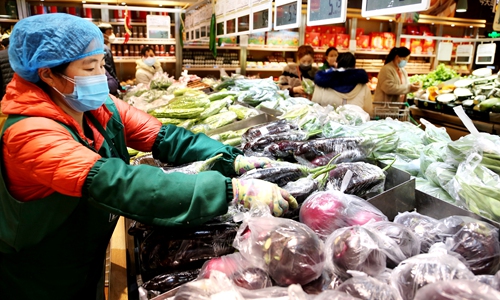HOME >> CHINA
Public urged to speed up shopping amid tighter supermarket rules
By Wang Qi Source:Global Times Published: 2020/3/3 18:28:40

A worker at a supermarket in Lianyugang, East China's Jiangsu Province, packs vegetables to reduce customer's waiting time in the market on Sunday. Amid the epidemic, many supermarkets in the city have provided such services as part of their effort of COVID-19 prevention. Photo: IC
China's top health authority has warned the public to spend less time in supermarkets and leave once they have bought their goods, given that at least 10 staff members from six supermarkets in China have been confirmed to have COVID-19 since the end of January.Zhang Liubo, an expert from China's National Health Commission, said at a press briefing Monday that while it is necessary to open markets and supermarkets to meet people's daily needs, citizens should reduce the frequency and duration of outdoor shopping trips as much as possible.
According to reports, there have been at least 10 cases of supermarket staff found to be infected with COVID-19 since January 31, the most recent being in Hong Kong SAR on February 29. There were a further 20 infections and 194 quarantines in a shopping mall in Tianjin's Baodi district in early February.
The Ministry of Commerce said on February 21 that over 95 percent of China's supermarkets and about 80 percent of convenience stores are back in operation.
Zhang said that people must wear masks in supermarkets and have their temperatures taken before entry. As a public space that is frequently crowded, supermarkets must conduct daily disinfection and promptly report suspected cases once they are found.
This Global Times reporter found that in some supermarkets in Beijing, goods such as vegetables and fruits have been marked up and packaged in advance in order to save transaction times and prevent unnecessary touching.
Wearing a mask and a protective gown, a member of staff at a Beijing-based Wu Mart supermarket, who requested anonymity, told the Global Times on Tuesday that the outfits had been provided by the company.
He also said that staff members are asked to record their temperature every day at work and after work. In addition, disinfection is carried out at least twice a day in public areas. Self-service and non-cash payments are being encouraged in the supermarket.
In addition to the routine temperature measures before entry, the reporter found notices reading "please keep 1.5 meters away" or "please wear masks" posted on Wu Mart store shelves, the cashier's desk, service desk and elevator.
Health authorities in Beijing have required supermarkets to set a maximum customer capacity strictly in accordance with the standard that each customer should have a space of no less than 2 square meters.
"We cannot control consumers' movements, but we are considering putting up signs urging our consumers to spend less time in the supermarket," said the staffer.
"We have to stay in our posts as people cannot live without supermarkets, so it is our duty to ensure our consumers' safety and the gradual resumption of people's normal lives in this special time, but that also requires joint efforts to overcome difficulties," he said.
RELATED ARTICLES:
Posted in: SOCIETY